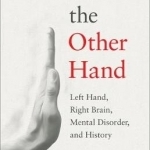On the Other Hand: Left Hand, Right Brain, Mental Disorder, and History
BookThis item doesn’t have any media yet
2017 | Education
Since the late Stone Age, approximately 10 percent of humans have been left-handed, yet for most of human history left-handedness has been stigmatized. In On the Other Hand, Howard I. Kushner traces the impact of left-handedness on human cognition, behavior, culture, and health. A left-hander himself, Kushner has long been interested in the meanings associated with left-handedness, and ultimately with whether hand preference can even be defined in a significant way. As he explores the medical and cultural history of left-handedness, Kushner describes the associated taboos, rituals, and stigma from around the globe. The words "left" and "left hand" have negative connotations in all languages, and left-handers have even historically been viewed as disabled. In this comprehensive history of left-handedness, Kushner asks why left-handedness exists. He examines the relationship-if any-between handedness, linguistics, and learning disabilities, reveals how toleration of left-handedness serves as a barometer of wider cultural toleration and permissiveness, and wonders why the reported number of left-handers is significantly lower in Asia and Africa than in the West.
Written in a lively style that mixes personal biography with scholarly research, On the Other Hand tells a comprehensive story about the science, traditions, and prejudices surrounding left-handedness.
Related Items:
| Published by | Johns Hopkins University Press |
| Edition | Unknown |
| ISBN | 9781421423333 |
| Language | N/A |
Images And Data Courtesy Of: Johns Hopkins University Press.
This content (including text, images, videos and other media) is published and used in accordance
with Fair Use.
